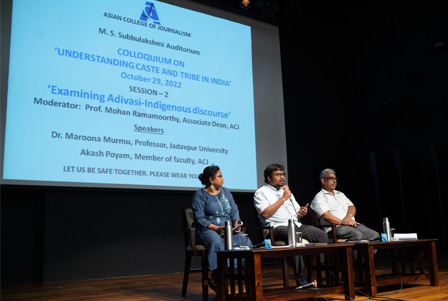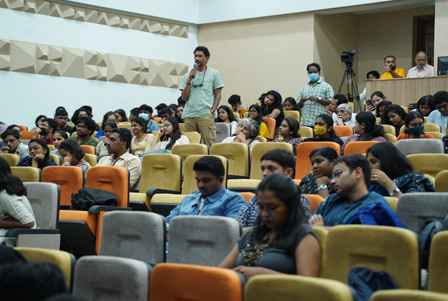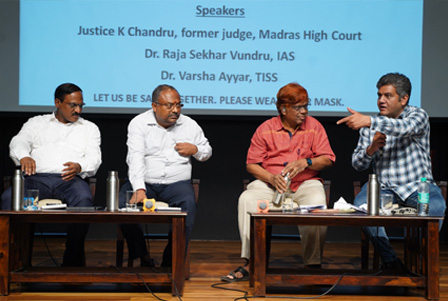Colloquium ‘Understanding Caste and Tribe in India’ on October 29, 2022



Although caste has come to be one of the defining features of Indian society, the roots of caste, as we know it today, are more from European colonists who took an Indian social custom and added their own spin to it.
That was one of the main points highlighted during a day-long colloquium on “Understanding Caste and Tribes in Contemporary India” organised by ACJ at the MS Subbulakshmi Auditorium on October 29.
The first speaker at the Colloquium, Surinder Singh Jodhka, Professor, Jawaharlal Nehru University demystified the phenomenon of caste—a pernicious social order where humans are divided into an endogamous hierarchy. This was based on the relative importance of their profession.
The Europeans’ understanding of caste was impaired by their reliance on the upper caste elite to understand Indian society.Jodhka pointed out that the term caste had its roots in the Portuguese word‘casta’, meaning race, lineage or tribe, and that no Indian language had an equivalent word that captured all that ‘caste’ stood for.
The current idea of caste is rooted in the idea of endogamy, or marriage within a social group, said Dr. S. Anandhi, professor at the Madras Institute of Development Studies (MIDS). As much as 95% of the marriages are endogamous, she pointed out.
Caste is a lived reality, with most of the informal sector engaged in informal occupations while the formal sector continued to be ruled by caste Hindus, she said.
MaroonaMurmu, professor of history at Jadavpur University, said the story of the scheduled tribes, or adivasis—who fall outside the limits set by caste— was always one of exploitation. There are nearly 705 tribes in India, she said. Of these, some 75 are particularly vulnerable.
Murmu, in her presentation during the second session of the day—one on tribes– narrated anecdotes about her own experiences as a ‘Santhal’ tribal and cited the travails of a tribal or adivasi in modern India.
Akash Poyam, faculty member at ACJ, said there was a constant effort at what he called the ‘Sanskritization’ and ‘Hinduisation’ of tribals, though in recent times there was growing resistance, especially from the youth of several tribes, to this process.
In the third session, Justice K Chandru, retired judge of Madras High Court, explained how Articles 15, and 16 of the Constitution were enabling causes for positive discrimination even though Article 14 guaranteed equality and protection against discrimination on the basis of among other things caste.
He, however, that the reservations granted under the Constitution, especially those relating jobs, were slowly being subverted by progressive privatization of public sector enterprises.
Elaborating on this point, Dr Varsha Ayyar, assistant professor at Tata Institute of Social Sciences (TISS), said that even when reservation exists and some seats are reserved for the historically disadvantaged castes, private companies refuse to hire them.. Even the most inclusive company does not include caste and tribe, she said.